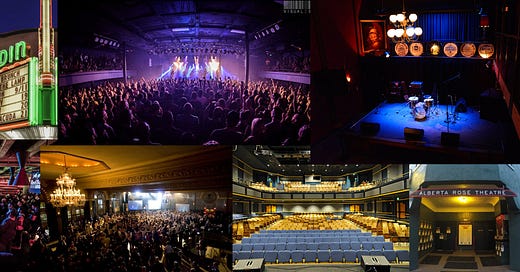Portland’s best chance to revive downtown may be at night
Many cities, including New York and Paris, have hired night mayors to find ways to attract people to nightlife venues
Portland Mayor Ted Wheeler keeps pushing businesses to force more of their workers to show up at their downtown offices. He might have more success by hiring a night mayor to promote after-hour nightlife in downtown Portland.
The concept of a night mayor began in Amsterdam and has spread to a growing number of U.S. cities trying to overcome post-pandemic downtown blues. Berlin, London and Paris also have night mayors.
“It's a paradigm shift in how to view nightlife,” says Salah Czapary, a night mayor whose official title is director of the Mayor's Office of Nightlife & Culture in Washington, DC. “Nightlife has been seen as a liability or a sector that needs heavy regulation. The shift has seen nightlife, and the cultural economy it supports, more as an asset that needs to be elevated, that needs to be regulated within reason, that needs policies and practices that support its growth.”
New York City’s night mayor, José Soegaard, underscores the value of the cultural economy. “Nightlife contributes $35 billion in economic activity in New York City's economy and supports nearly 300,000 jobs and generates $700 million in local tax revenues.” Washington’s nightlife industry brings in $7.1 billion in annual revenue, accounts for 65,999 jobs and contributes $562 million in annual tax revenue.
Night Mayors Identify Nightlife Opportunities
Orlando’s night mayor faced a different challenge. Dominque Greco said, “It was surprising how little the authorities, the municipality, knew about the nightlife world and what happens in their downtown at night, and how best to be more progressive and more proactive.” One of the biggest unrecognized challenges, she said, was downtown congestion and safety when all the bars closed at 2 a.m.
Her suggestion, which Orlando officials followed: Create rideshare hubs throughout the night-time entertainment zones. Along with easing traffic flows, the city added extra security and improved lighting to make the entertainment venues more inviting and safer.
Portland is known for its nightlife, so a night mayor would seem like a natural choice. The timing couldn’t be better as Wheeler finds himself in the middle of a spat between Live Nation, the mega entertainment company with financial ties to Ticketmaster, and the city’s 300 or so independent venues.
Portland’s Spat Over New Venue
According to reporting by Nigel Jaquiss of Willamette Week, Wheeler has agreed to a deal that involves constructing a new 4,000-seat entertainment venue on vacant land on Southeast Water Avenue, just north of the Hawthorne Bridge. The venue would be managed by Live Nation, the world’s largest live entertainment company.
Jaquiss notes Live Nation “owns or controls 338 music venues worldwide, including the Hayden Homes Amphitheater in Bend, the Gorge Amphitheatre in George, Wash., and Lumen Field in Seattle. It manages 410 bands, from U2 to Pitbull. It promotes concerts and, in 2010, bought Ticketmaster, giving it end-to-end control of the live music business.” Live Nation doesn’t have a venue in Portland.
As it turns out, Portland is home to one of Live Nation’s fiercest critics: David Leiken, owner of Roseland Theater and a former concert promoter and ticketing operation owner.
“I’m deeply disturbed that the City of Portland would choose to ally itself with a company intertwined with Ticketmaster, which has led to major Justice Department concerns, and has been propped up by massive infusions of capital from the Saudi Arabian government,” Leiken told Jaquiss. “It makes LIV Golf look like child’s play.” Jaquiss verified Saudi Arabia’s Public Investment Fund is Live Nation’s biggest investor.
Leiken unsuccessfully promoted investing in the Old Town/ChinaTown area where many of the city’s best known entertainment venues are located, including the Darcelle XV Showplace that is the Guinness World Record holder for the longest drag show. Leiken’s pitch involved the building being vacated by the University of Oregon.
A Wheeler spokesman defended the arrangement with Live Nation. “This investment in our community will positively impact workers, small businesses and the Central Eastside neighborhood while requiring no public subsidy. There’s a clear gap in the market for a venue of this size.”
The developer teamed up with Live Nation to build the venue also defended the choice. “A ground-up concert venue at this site is a viable project that will generate economic impact for the community. Live Nation is a strong financial partner and is also investing in the design and construction. As a community asset, the venue will host a variety of events and will also be available to all local promoters to book.”
Leiken and other independent venue operators say the project’s connections to Live Nation and Ticketmaster will eventually squeeze them out. The new venue also could pose competition for Arlene Schnitzer Concert Hall and Keller Auditorium, which are in downtown.
The Absent Voice of Venue Patrons
Notably absent from the debate is the voice of nightlife patrons. What do they want? What do they think about the new venue and its impact on existing venues? Talking to patrons is part of the job description of night mayors.
As Greco discovered in her night mayor role in Orlando, patrons of the night are interested in fun venues, security and a safe way to get home. The Live Nation venue may well fill a void in Portland’s venue inventory and be an economic boost to nearby Southeast Portland. But is it the answer that will draw more people from the metropolitan area back downtown at night?
We don’t know because nobody has asked the most basic consumer research question, a question that would seem natural to a night mayor.
Gary Conkling has been a newsman, congressional aide and public affairs professional for more than 50 years.





